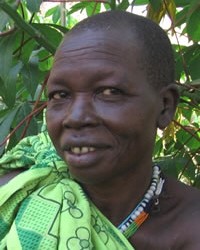Biykol in South Sudan

Photo Source:
Anonymous
|
Send Joshua Project a map of this people group.
|
| People Name: | Biykol |
| Country: | South Sudan |
| 10/40 Window: | No |
| Population: | 600 |
| World Population: | 600 |
| Primary Language: | Komo (Sudan) |
| Primary Religion: | Ethnic Religions |
| Christian Adherents: | 10.00 % |
| Evangelicals: | 6.00 % |
| Scripture: | Portions |
| Ministry Resources: | No |
| Jesus Film: | No |
| Audio Recordings: | Yes |
| People Cluster: | Nilotic |
| Affinity Bloc: | Sub-Saharan Peoples |
| Progress Level: |
|
Introduction / History
The Biykol people are a small ethnic group located in Upper Nile State, South Sudan. They speak Komo (Sudan), a language belonging to the Koman branch of the Nilo-Saharan language family. All members speak Komo, but it is considered vulnerable due to the tribe's small size and limited geographic spread.Historically, Biykols have lived in remote areas with little contact with the outside world. Their cultural and linguistic identity has remained relatively intact, though they have had minimal exposure to formal education or modern infrastructure.
What Are Their Lives Like?
The Biykol live in rural, isolated communities, primarily practicing subsistence agriculture, fishing, and gathering. Their lifestyle is shaped by the natural environment, with homes built from local materials and diets based on seasonal crops and river resources. Social structures are clan-based, and decision-making is communal.Due to their remote location, the Biykol have limited access to healthcare, education, and economic opportunities. Their communities are often overlooked in national development plans, leaving them vulnerable to poverty and displacement.
What Are Their Beliefs?
The majority of the Biykol adhere to ethnic religions, with 90% practicing traditional spiritual beliefs. These include ancestor worship, ritual ceremonies, and nature-based spirituality. A small minority—10%—identify as Christian, and only 6% are considered Evangelical believers.Christianity has made limited inroads, and there is no significant history of church planting or discipleship among the Biykol. Bible portions exist in their language, but there is no complete New Testament or full Bible translation available.
What Are Their Needs?
With minimal exposure to the gospel, there is a need for Bible translation, discipleship, and church planting efforts.Literacy rates are low, and there are no formal schools in Biykol communities. Educational programs could help preserve their language and improve future prospects.Biykols lack access to basic medical services. Mobile clinics and health education could significantly improve their well-being. Roads, clean water, and communication networks are virtually nonexistent in Biykol areas. Development efforts are needed to connect them to the broader society in South Sudan.
Prayer Points
Pray for the translation of a complete Bible into Komo (Sudan), the Biykol's heart language.Ask God to raise up local and international workers to share the gospel with the Biykol.Pray for peace and protection in Upper Nile State, allowing safe outreach and development.Intercede for educational and healthcare initiatives to reach Biykol communities.Pray for the preservation of their cultural identity and for wisdom among tribal leaders.